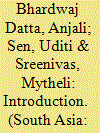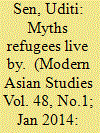|
|
|
Sort Order |
|
|
|
Items / Page
|
|
|
|
|
|
|
| Srl | Item |
| 1 |
ID:
178861


|
|
|
|
|
| Summary/Abstract |
This Introduction frames a collection of papers that explore the roles played by women—as volunteers, organisers, bureaucrats, politicians and citizens—in shaping the emerging ideologies and structures of independent India. Although women’s participation is both understudied and inadequately theorised in existing scholarship, the papers in this collection demonstrate that the decades following India’s Independence witnessed the participation of women in every sphere of politics and nation-building. The introductory essay tracks the limits and possibilities of women’s agency and gendered citizenship in these spheres to historicise the women’s movement during the post-Independence decades, and to examine its fraught relationship with feminism, patriarchal society and state politics.
|
|
|
|
|
|
|
|
|
|
|
|
|
|
|
|
| 2 |
ID:
131771


|
|
|
|
|
| Publication |
2014.
|
| Summary/Abstract |
Within the popular memory of the partition of India, the division of Bengal continues to evoke themes of political rupture, social tragedy, and nostalgia. The refugees or, more broadly speaking, Hindu migrants from East Bengal, are often the central agents of such narratives. This paper explores how the scholarship on East Bengali refugees portrays them either as hapless and passive victims of the regime of rehabilitation, which was designed to integrate refugees into the socio-economic fabric of India, or eulogizes them as heroic protagonists who successfully battled overwhelming adversity to wrest resettlement from a reluctant state. This split image of the Bengali refugee as both victim and victor obscures the complex nature of refugee agency. Through a case-study of the foundation and development of Bijoygarh colony, an illegal settlement of refugee-squatters on the outskirts of Calcutta, this paper will argue that refugee agency in post-partition West Bengal was inevitably moulded by social status and cultural capital. However, the collective memory of the establishment of squatters' colonies systematically ignores the role of caste and class affiliations in fracturing the refugee experience. Instead, it retells the refugees' quest for rehabilitation along the mythic trope of heroic and masculine struggle. This paper interrogates refugee reminiscences to illuminate their erasures and silences, delineating the mythic structure common to both popular and academic refugee histories and exploring its significance in constructing a specific cultural identity for Bengali refugees.
|
|
|
|
|
|
|
|
|
|
|
|
|
|
|
|
| 3 |
ID:
178869


|
|
|
|
|
| Summary/Abstract |
In the aftermath of Partition, the Government of India suddenly found itself to be responsible for a large number of refugee women who were not ‘attached’ to male guardians. The national government readily acknowledged the fate of these widowed, abandoned or abducted women as a sphere of feminine expertise and sought the active participation of prominent social workers such as Rameshwari Nehru, Mridula Sarabhai, Ashoka Gupta and Romola Sinha. Referred to as ‘lady social workers’, these women worked as volunteers and advisors to rehabilitate unattached women. Focusing on the voluntary service of social workers in West Bengal, and drawing upon the memoirs and personal papers of Ashoka Gupta, this article seeks to understand the limits and possibilities of this role. Was their role entirely circumscribed by the larger patriarchal vision of rehabilitation that treated ‘unattached’ refugee women as permanent liabilities of the state, or could they author policy that benefitted refugee women? Through a close reading of the solutions, schemes and reforms proposed by lady social workers, this paper suggests a complex relationship that resists such binaries.
|
|
|
|
|
|
|
|
|
|
|
|
|
|
|
|
|
|
|
|
|